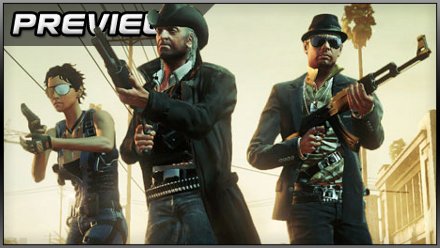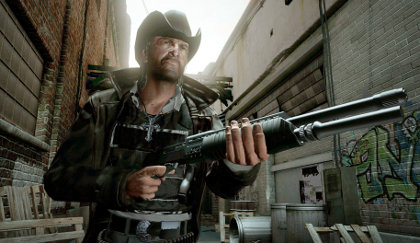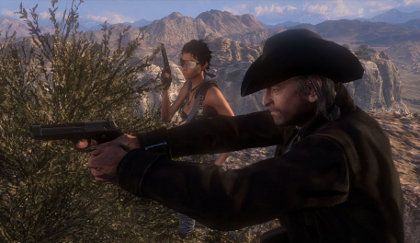
A man wearing a long leather coat and faintly ludicrous ten gallon hat stands with his back to the camera, looking out over a sun-drenched canyon floor. He recites verses to himself absently, gobbets of Old Testament, his Californian twang calling to mind the clatter of saloon doors, the hiss of tumbleweeds at high noon. Bristles of fern and tall cacti ripple in the heat rising from the sand.
It could be a scene from one of Thomas Ford’s rootin’ tootin’ epics, but this isn’t the Wild West – or at least, not the one we remember. The camera sweeps round, exposing the Kevlar plates strapped to the man’s chest and the pick-up truck parked behind him. Voices crackle over an earpiece, and gunshots cut through the sizzling air, dragging the anonymous warrior-preacher and his audience back to the modern era.
Call of Juarez: The Cartel is a game with one foot in the past – or more precisely, perhaps, a game with one foot in the present. The third in Techland’s hard-boiled gun-slinging series, it enters a world in which the Wild Western shooter, once just another bandito fleeing the wrath of Sheriff Contemporary Middle Eastern Scenario, has ridden to fame and fortune. That’s mostly the work of one videogame, the much-caressed, multiple-zillion-selling Red Dead Redemption, and it’s of course this game, however fairly or unfairly, that The Cartel will be measured against when it hits consoles and PC later this year.
Lacking Rockstar’s cultural cachet and reliably excellent writing, just how are the Techland gang and publisher Ubisoft to set their whiskery brainchild apart? Well, firstly by sternly resisting the temptation to go open world, a prospect toyed with at intervals in the otherwise heavily micro-managed Bound in Blood.
Outlaws to the trend
“It’s true that Red Dead Redemption is an excellent game, and if you release a western game now you’re going to be compared,” Senior Producer Samuel Jacques admits to VGD after walking us through a two-mission demo, “That said, we’re a different kind of game. We’re a shooter, we’re more action-oriented, while RDR is what Rockstar knows how to do very well – it’s a sandbox game where you can wander through the environment.”
The other point of differentiation is a tad more drastic: The Cartel’s 16 missions take place over a century after the events of Rockstar’s magnum opus, scattered across the ganglands of Los Angeles, the Mexican town of Juarez itself and the intervening desert. But hold your horses a second, pardners – can a game in which mouthy tattooed pimps unload automatic weapons at spangly inner city discotheques really be styled a “Wild Western”? Why yes, Tex, yes it can – and “style” may be the key word.
In Techland’s view, conjuring the spectre of the American frontier isn’t a question of adhering to chronology, but of embracing certain archetypes and attitudes, a certain look and feel. “We keep saying that the Wild West was universal, it was not an era, it was a spirit – we want to prove that,” Jacques explains. “We’ve been saying that since the first Call of Juarez.”
Which makes perfect sense when you think about it: the Wild Western in film and literature has always been rather closer to fiction than documentary reality, whether you’re talking about the clean-shaven, clean-living John Wayne kind or the oppressive, unsentimental No Country For Old Men variety. By freeing the genre of its historical shackles, time-warping its tropes and techniques into modern-day America, Techland’s writers have set the stage for some spicy bits of self-referential humour, like the directorial gag outlined in my opening paragraph.

As I walk through the shadow of the valley of death I shall fear no evil, for the checkpoints are evenly spaced...
Less agreeably, they’ve also treated the Wild Western to a fresh layer of controversy. Mere hours after The Cartel was announced, Fox News Latino accused Ubisoft and Techland of glamorising real-life violence in the region. Juarez, see, is a very real township, and not one trumpeted for its law-abiding youth. The broadcaster’s case, apparently based on a single press release, is as rife with assumption as you’d expect, but in Fox’s defence, the implication that the romanticised anarchy of the Old West can be easily equated with the current state of the US-Mexican border deserves a bit of scrutiny.
Jacques says the Cartel team are following the Fox story “pretty closely”, but that the game itself will steer clear of any socio-political nitty-gritty. “The game was Call of Juarez for years before events took such a dimension,” Jacques tells us. “We are not really depicting any real life act. The game is an entertainment product.”
“We’re going to Juarez, but it could happen somewhere else,” he adds. “We could go to Argentina. We’re not supporting the violence – we’re playing cops, we’re not playing the Cartel guys.”






 Satoru Iwata Video Interview - the late Nintendo president spoke with Kikizo in 2004 as 'Nintendo Revolution' loomed.
Satoru Iwata Video Interview - the late Nintendo president spoke with Kikizo in 2004 as 'Nintendo Revolution' loomed. Kaz Hirai Video Interview - the first of Kikizo's interviews with the man who went on to become global head of Sony.
Kaz Hirai Video Interview - the first of Kikizo's interviews with the man who went on to become global head of Sony. Ed Fries Video Interview - one of Xbox's founders discusses an epic journey from Excel to Xbox.
Ed Fries Video Interview - one of Xbox's founders discusses an epic journey from Excel to Xbox. Yu Suzuki, the Kikizo Interview - we spend time with one of gaming's most revered creators.
Yu Suzuki, the Kikizo Interview - we spend time with one of gaming's most revered creators. Tetris - The Making of an Icon: Alexey Pajitnov and Henk Rogers reveal the fascinating story behind Tetris
Tetris - The Making of an Icon: Alexey Pajitnov and Henk Rogers reveal the fascinating story behind Tetris Rare founders, Chris and Tim Stamper - their only interview? Genuinely 'rare' sit down with founders of the legendary studio.
Rare founders, Chris and Tim Stamper - their only interview? Genuinely 'rare' sit down with founders of the legendary studio. The History of First-Person Shooters - a retrospective, from Maze War to Modern Warfare
The History of First-Person Shooters - a retrospective, from Maze War to Modern Warfare